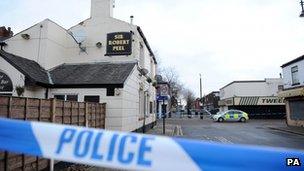Fall in crime in England and Wales 'may be exaggerated'
- Published
- comments

Violent crime makes headlines but overall crime against adults fell in the 12 months to September 2012
A study of crime trends in England and Wales has suggested the fall in offences recorded by police may have been exaggerated.
The Office for National Statistics said the "rate of reduction" in recorded crime "may overstate" the decrease.
Shadow policing minister David Hanson called for Her Majesty's Inspectorate of Constabulary to look at the apparent discrepancies.
The Home Office said there was "no simple answer" to the apparent anomaly.
The ONS compared certain categories of crimes and found police-recorded offences had fallen by 33% over the previous five years, while data from the Crime Survey of England and Wales suggested a decline of 17%.
The ONS also published crime figures for the 12 months to the end of September 2012, external, which showed continued falls in virtually every category.
BBC home affairs correspondent Danny Shaw said police recorded 7% fewer crimes than the year before, while the Crime Survey of England and Wales indicated there had been a "statistically significant" fall of 8%.
'Informal pressure'
ONS statistician John Flatley said the bigger falls in police-recorded crimes may be due to pressures to meet targets on crime reduction and detections.
"It's more the culture and informal pressure of having targets and expectations," he said.
Other possible reasons for under-recording suggested by the ONS include more low-level crimes being dealt with informally and outside the formal crime-recording system, with officers given greater discretion.
Mr Flatley said it was also "possible" that reductions in police budgets and officers meant fewer offences were being recorded.
He said as resources were more stretched the "balance shifts" to less compliance with crime-recording systems.
Crime Prevention Minister Jeremy Browne said crime was continuing to fall and was now at the lowest level since the survey began.
"Police reform is working. We have swept away central targets, reduced bureaucracy and these figures show forces are rising to the challenge of doing more with less. Many have achieved significant reductions in crime with reduced budgets," he said.
'Build trust'
Shadow policing minister Mr Hanson said: "There are warning signs for the police and Home Office, with the increase in theft. And earlier this week the British Retail Consortium's survey showed an increase of over 15% in the cost of retail crime alongside a drop in the proportion of crime reported by retailers to the police from 48% to 16%.
"This is perhaps why the Office for National Statistics has begun to express concern that apparent reductions in police recorded crime may be exaggerated.
"The home secretary should examine urgently whether, as the ONS suggest, the cuts to police budgets mark a return to fewer crimes being recorded by the police."
A Home Office spokesman said: "As the ONS highlights in their report, there is no simple answer as to why there has been some variation in crime trends between the Crime Survey and police-recorded crime. The two measurements were always intended to assess different things and have different strengths."
The spokesman said the Home Office had transferred the statistics to the ONS to "build public trust" and was "continuing to work with forces to ensure accurate data".
The Association of Chief Police Officers' lead on statistics, Douglas Paxton, said the study had noted the quality of crime recording by the UK police was "amongst the best in the world".
"Ensuring our data is as robust as it can be has a direct impact on public trust and confidence and we will continue to ensure forces continue to meet the national standard when it comes to recording crimes," said Mr Paxton, Deputy Chief Constable of Staffordshire Police.
- Published18 October 2012
- Published23 January 2013
- Published19 April 2011